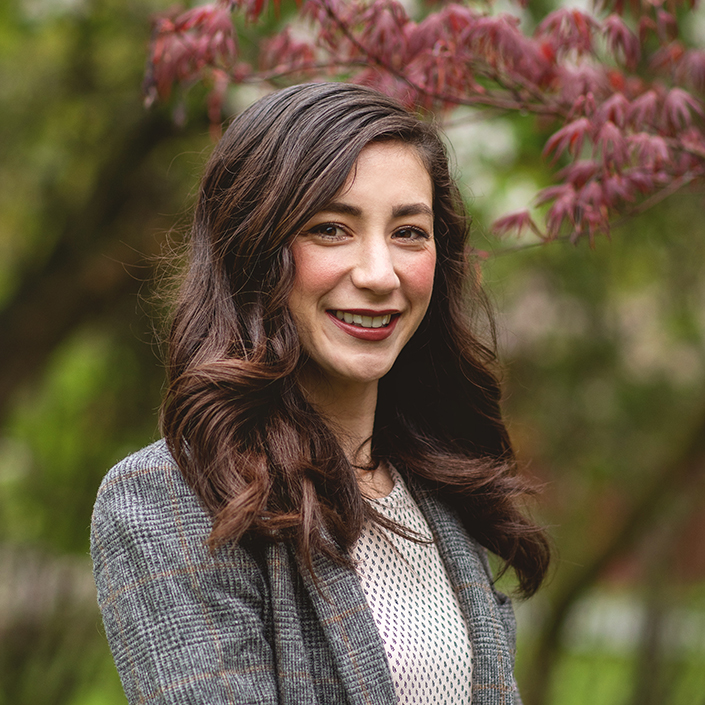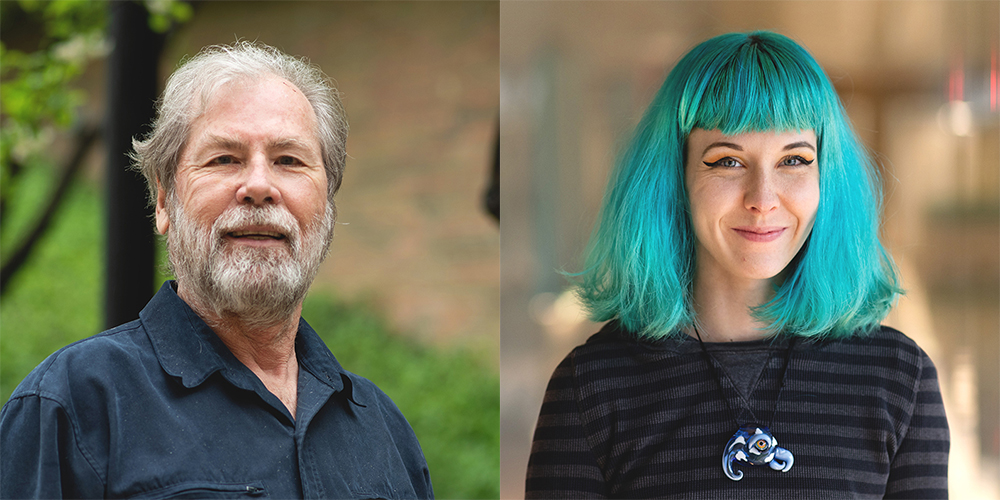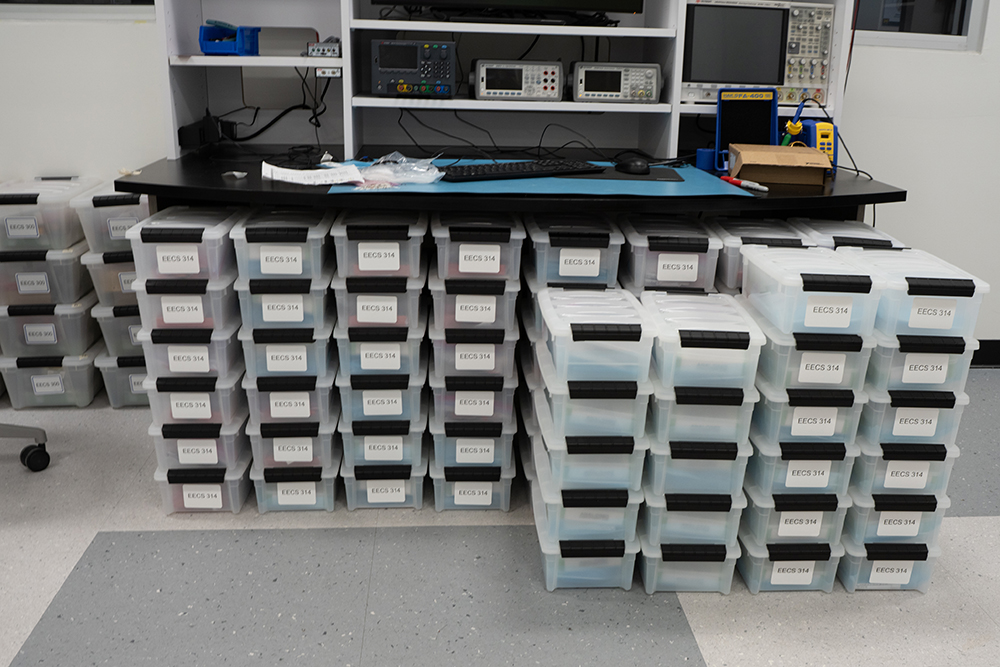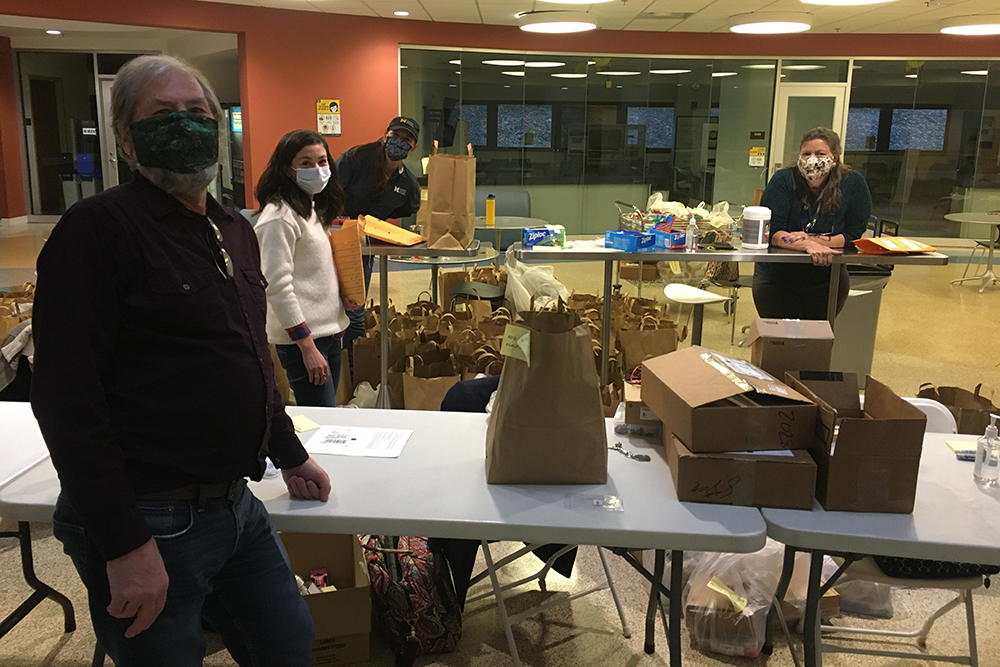ECE Lab Kit team recognized by the College of Engineering with the Team Staff Excellence Award

 Enlarge
Enlarge
The team of Silvia Dykstra, Rob Giles, Bobbi Scheffer, Jennifer Honeycutt, Nicole Doher, and Jeffrey Horosko have been awarded the Team Staff Excellence Award from the College of Engineering for their efforts to create and distribute individual lab kits to students around the world after the pandemic forced classes to shift to remote instruction.
“We simply could not have fulfilled our teaching mission without them,” says Prof. Mingyan Liu, the Peter and Evelyn Fuss Chair of ECE. “They are an indispensable part of our community, and they exemplify truly the best of us at a time of national crisis. I am deeply grateful for their dedication, professionalism, and excellence in their service.”
We simply could not have fulfilled our teaching mission without them.
Prof. Mingyan Liu, Peter and Evelyn Fuss Chair of ECE
Lab courses where students gain direct hands-on experience in learning electronics are considered a critical component of engineering education. When in-person instruction was discontinued, this team of ECE staff was tasked with finding a new way to deliver a meaningful lab experience for students in EECS 215, 216, 230, 311, 314, and 330 for Fall 2020 and Winter 2021 terms, as well as EECS 300 for Winter 2021.
By August 2020, the team had designed and assembled over 600 lab kits, which were handed out to students on campus and shipped to students around the world. At the end of the semester, the team recollected the lab kits, sanitized them, reassembled them, and redistributed them to the next cohort of students for Winter 2021. Over 1,200 students have now been served through this new system.
It’s astonishing what this team accomplished, and it was truly a herculean effort.
Prof. David Wentzloff
“I can’t state in stronger terms that this staff is truly outstanding and deserves recognition for everything they did to make this lab transition a success,” says Prof. David Wentzloff, who used the lab kits to teach EECS 215 this past Fall. “It’s astonishing what this team accomplished, and it was truly a herculean effort.”
Meet the team:

 Enlarge
Enlarge
Silvia Dykstra (ECE Events Assistant) was the organizer and leader for this project. She worked with faculty instructors to put together parts kits that could be loaned to students for remote learning. Many of the kits were very complex and included portable lab instruments, dozens of components, and essential materials, such as breadboards and wires. Silvia coordinated every aspect of this, including managing the assembly of the kits, contacting students, arranging on-campus pickup when possible, and shipping when necessary.

 Enlarge
Enlarge
Rob Giles (EECS Instructional Laboratory Support Specialist) and Bobbi Scheffer (EECS Instructional Laboratory Support) provided the technical support. They assembled the actual kits and tested and refurbished them as necessary between the Fall and Winter terms. Rob worked with students to troubleshoot damaged components in kits throughout the semester and issue replacements. For the electromagnetics classes, which needed custom circuit boards with specialized antennas, Bobbi hauled dozens of tubs of parts home and set up a one-woman electronics workshop in her basement.

 Enlarge
Enlarge
Jennifer Honeycutt (Purchasing Supervisor), Nicole Doher (ECE Financial/Purchasing Clerk), and Jeffrey Horosko (ECE Purchasing Clerk), normally handle routine purchasing for the department. The lab kits presented two extraordinary challenges for them. First, the lab kits required finding low cost portable alternatives to the expensive instruments normally used in on-campus labs. The pandemic created severe shortages of many electronic devices, including the portable instruments. This team did many global searches to get the critical devices in sufficient quantities for all students. Second, they had to ship the kits to students who could not come to Ann Arbor, including those located on the other side of the world. This presented challenges not normally encountered, such as making complex international shipping arrangements.



 MENU
MENU 
